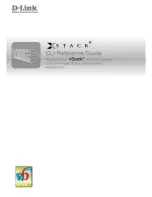
Configuring Access Control Lists
139
Table 75. Extended or Named IPv4 ACL Match Criteria
Field
Description
Match Criteria
Every
When this option is selected, all packets will match the rule and will be either permitted or
denied. This option is exclusive to all other match criteria, so if Every is selected, no other
match criteria can be configured. To configure specific match criteria, this option must be
clear.
Protocol
The IANA-assigned protocol number to match within the IP packet. You can also specify one
of the following keywords: EIGRP, GRE, ICMP, IGMP, IP, IPINIP, OSPF, PIM, TCP, or UDP.
Fragments
IP ACL rule to match on fragmented IP packets.
Source IP Address /
Wildcard Mask
The source port IP address in the packet and source IP wildcard mask (in the second field)
to compare to the IP address in a packet header. Wild card masks determines which bits in
the IP address are used and which bits are ignored. A wild card mask of 255.255.255.255
indicates that no bit is important. A wildcard of 0.0.0.0 indicates that all of the bits are
important. Wildcard masking for ACLs operates differently from a subnet mask. A wildcard
mask is in essence the inverse of a subnet mask. With a subnet mask, the mask has ones
(1's) in the bit positions that are used for the network address, and has zeros (0's) for the bit
positions that are not used. In contrast, a wildcard mask has (0's) in a bit position that must
be checked. A '1' in a bit position of the ACL mask indicates the corresponding bit can be
ignored. This field is required when you configure a source IP address.
Source L4 Port
The TCP/UDP source port to match in the packet header. The Source L4 Port and Destination
L4 port are configurable only if protocol is either TCP or UDP. Equal to, Not Equal to, Greater
than, and Less than options are available. For TCP protocol: BGP, Domain, Echo, FTP, FTP-
Data, HTTP, SMTP, Telnet, WWW, POP2, or POP3 For UDP protocol: Domain, Echo, NTP,
RIP, SNMP, TFTP, Time, or WHO
Destination IP Address /
Wildcard Mask
The destination port IP address in the packet and destination IP wildcard mask (in the second
field) to compare to the IP address in a packet header. Wild card masks determines which bits
in the IP address are used and which bits are ignored. A wild card mask of 255.255.255.255
indicates that no bit is important. A wildcard of 0.0.0.0 indicates that all of the bits are
important. Wildcard masking for ACLs operates differently from a subnet mask. A wildcard
mask is in essence the inverse of a subnet mask. With a subnet mask, the mask has ones
(1's) in the bit positions that are used for the network address, and has zeros (0's) for the bit
positions that are not used. In contrast, a wildcard mask has (0's) in a bit position that must
be checked. A 1 in a bit position of the ACL mask indicates the corresponding bit can be
ignored. This field is required when you configure a destination IP address.
Destination L4 Port
The TCP/UDP destination port to match in the packet header. The Source L4 Port and
Destination L4 port are configurable only if protocol is either TCP or UDP. Equal to, Not Equal
to, Greater than, and Less than options are available. For TCP protocol: BGP, Domain, Echo,
FTP, FTP-Data, HTTP, SMTP, Telnet, WWW, POP2, or POP3 For UDP protocol: Domain,
Echo, NTP, RIP, SNMP, TFTP, Time, or WHO
IGMP Type
IP ACL rule to match on the specified IGMP message type. This option is available only if the
protocol is IGMP.
ICMP Type
IP ACL rule to match on the specified ICMP message type. This option is available only if the
protocol is ICMP.
ICMP Code
IP ACL rule to match on the specified ICMP message code. This option is available only if the
protocol is ICMP.
ICMP Message
IP ACL rule to match on the ICMP message type and code. Specify one of the following
supported ICMP messages: Echo, Echo-Reply, Host-Redirect, Mobile-Redirect, Net-
Redirect, Net-Unreachable, Redirect, Packet-Too-Big, Port-Unreachable, Source-Quench,
Router-Solicitation, Router-Advertisement, Time-Exceeded, TTL-Exceeded, and
Unreachable. This option is available only if the protocol is ICMP.
TCP Flags
IP ACL rule to match on the TCP flags. When a + flag is specified, a match occurs if the flag
is set in the TCP header. When a - flag is specified, a match occurs if the flag is not set in the
TCP header. When Established is specified, a match occurs if either RST or ACK bits are set
in the TCP header. This option is available only if the protocol is TCP.
















































